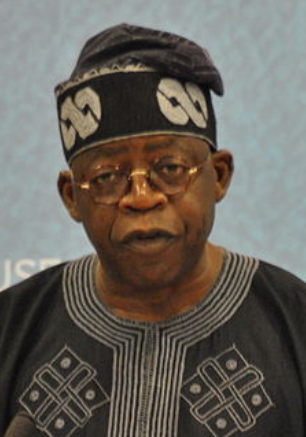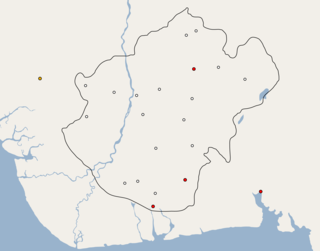
Ebonyi State is a state in the South-East geopolitical zone of Nigeria, bordered to the north and northeast by Benue State, Enugu State to the west, Cross River State to the east and southeast, and Abia State to the southwest. Named for the Abonyi (Aboine) River—a large part of which is in the state's south—Ebonyi State was formed from parts of Abia and Enugu state in 1996 and has its capital as Abakaliki.

Abakaliki is the capital city of Ebonyi State in southeastern Nigeria, located 64 kilometres (40 mi) southeast of Enugu. The inhabitants are primarily members of the Igbo nation. It was the headquarters of the Ogoja province before the creation of the Southeastern State in 1967.
Onueke is the ancestral headquarters of the Ezza, Ezzas are the most populous clans in the Ebonyi State of Nigeria. Ezza people live in virtually all three senatorial zones of Ebonyi State and beyond, but are concentrated in the Ezza North, Ezza South, Onicha, Ishielu, and Ohaukwu Local Government Areas. The Ezza people in Ohaukwu dominates in Effium community inhabiting the Minor communities of Inikiri Umuezeoka, Umuezeokaoha, and Kpakpaji. Traditionally, Ezaas in all walks of life return to Onueke to offer sacrifices to the graves of their progenitors: Ezekuna and his wife, Anyigo Ezekuna. Coincidentally, Sacred Heart Parish, Onueke, also serves as the headquarters of Christianity for Ezaa Catholics. All saints parish, Onueke, also the headquarter of Ezza presbytery "Presbyterian Church of Nigeria". Other Pentecostal denominations present at Onueke include Foursquare Gospel Church Nigeria.
Orring (Korring) is an Upper Cross River language spoken by the Orring people of Nigeria. Korring language is spoken by the Orring people who are found in Benue, Cross River and Ebonyi states of Nigeria.
The Ikwo is a subgroup of the Igbo people who live in southeastern Nigeria. The area is rich in mineral resources, and the ancestors of today's inhabitants developed bronze-casting techniques over a thousand years ago, some found in the town of Igbo Ukwu. The creativity and technical skill demonstrated by those early Igbo bronze, metal and terra cotta crafters is recognized as among the finest in the history of the world. They number around 600,000.
Izi is an Igboid language spoken in Ebonyi state in Nigeria. It forms a dialect cluster with the closely related languages Ikwo, Ezza, and Mgbo.
Izzi is a North Eastern Igbo sub-group, in South Eastern, Nigeria. It is also the name of the territory in which they live, the Local Government Area of Izzi. They speak the Izzi dialect. Izzi is spoken majorly in Ebonyi State and some parts of Benue State.
Ezza North is a local government area in Ebonyi State Nigeria. Its headquarters is at Ebiaji town. It has an area of 305 km2 and a population of 145,619 at the 2006 census. Ezza North created in 1996 alongside other LGAs in the then new Ebonyi State used to be part of old Ezza Local Government Area. It is a predominant Igbo town inhabited by the Ezza and the Orring people of Idzem (Amuda) and Okpolo (Okpomoro) extraction. Since her creation Ezza North has been on the part of progressive development under Ebonyi State Government dominated by PDP.
Ezza South is a local government area located in Ebonyi state on south-eastern Nigeria. Its headquarters is Onueke, which also serve as a central unification town for the Ezza nation as well as headquarters of Ebonyi Central senatorial zone. It was created on October 1, 1996, amongst other local government areas in the then new Ebonyi state by the military government of General Sani Abacha. Ezza South prior to its creation was part of old Ezza Local government area. The people are predominantly of Igbo stock. They speak Ezza dialect and the central Igbo language. Their major occupations are farming and trading as well as emerging civil servant class. It has an area of 324 km2 and a population of 133,625 at the 2006 census.
Ishielu is a Local Government Area of Ebonyi State, Nigeria. Its headquarters are in the town of Ezillo.
Onicha is a Local Government Area of Ebonyi State, Nigeria. It's made up of the following towns; Oshiri, Onicha-Igboeze, Abaomege, Ukawu, Isu and Isinkwo. The headquarters is located in the town of Isu. The area council derived its name from the town of Onicha-Igboeze.
Effium is the largest autonomous Igbo community in Ebonyi State of southeast region, Nigeria. Effium is located in the Ohaukwu local government area of Ebonyi State. The indigenous people are known as Effiom and Ezza Effium, but the most spoken indigenous language is the Ezza language.

Ikwo is the largest Local Government Area in Ebonyi State. It is situated on the eastern part of the state. The city and local government area has a land mass of approximately 500 square kilometers and shares a border with Abakaliki, Izzi and Ezza Local Government Areas as well as Cross River State. It is the home land of a former Governor of the state Chief Martin Elechi. Ikwo is the home to Alex Ekwueme Federal University Ndufu Alike Ikwo (FUNAI) One of the Universities established by president Goodluck Jonathan. Ikwo also plays host to Ebonyi State College of Education, Ikwo at Ndufu Echara.
Ezaa is an Igboid language spoken in Ebonyi state in Nigeria. It forms a dialect cluster with closely related Izii, Ikwo, and Mgbo, though they are only marginally mutually intelligible.

The Amuda people, also known as the Idzem people, are a subgroup of the Orring ethnolinguistic group in the southeastern Nigeria state of Ebonyi. It includes four major clans: Ojolokpa, Buolung, Buora and Anmosho. The Amuda people are found predominantly in the Ezza North and Ohaukwu Local Government Areas.

Ntezi is located in the eastern outskirt of Ishielu LGA of Ebonyi State in Nigeria. Ntezi is pronounced Eh-teh-ji(Eteji) by the natives, and belongs to the Orring, Oring or Orri People. The dialect of Ntezi is K'eteji with the attached 'k' prefix given the name Keteji, a sub-language of korring spoken by Orring people in their diverse dialects across their settlements in Nigeria and Cameroon. Ntezi is an Orring sub-ethnic group. The Orring people occupy a scattered heterogeneous territories coexisting in three states in three geopolitical zones in Nigeria which are Benue, Cross River and Ebonyi States. Orring people are the aboriginal Abakaliki people settling in the town of Ntezi-Aba living alongside their Mbembe and Ekoi neighbours prior to the coming of the later Abakaliki group. The Orring people are proxy to their neighbours, and this proximity has over the years, led to some intergroup relationship through marriage, beliefs and cultural exchanges resulting to creation of a mixed civilizations that resulted to the number of differences among the aborigines. This is the case of linguistic and cultural evidence among people.

The 2023 Ebonyi State gubernatorial election will take place on 18 March 2023, to elect the Governor of Ebonyi State, concurrent with elections to the Ebonyi State House of Assembly as well as twenty-seven other gubernatorial elections and elections to all other state houses of assembly. The election—which was postponed from its original 11 March date—will be held three weeks after the presidential election and National Assembly elections. Incumbent APC Governor Dave Umahi is term-limited and cannot seek re-election to a third term.

The 2023 Nigerian presidential election in Ebonyi State will be held on 25 February 2023 as part of the nationwide 2023 Nigerian presidential election to elect the president and vice president of Nigeria. Other federal elections, including elections to the House of Representatives and the Senate, will also be held on the same date while state elections will be held two weeks afterward on 11 March.
Ntezi-Aba is a village in Abakaliki, the Ebonyi State Capital. It is located at the capital city of Abakaliki, and listed as a town under the Ebonyi local government area of Ebonyi State. The town is situated near Obiagu and Ofe-Iyiokwu villages of Izzi clan. Ntezi-Aba is presently inhabited by the Igbo subgroup of Izzi. However the town is as old as Abakaliki itself, tracing its origin back to the Orring people, a western Bantu speaking people found in Ebonyi, Benue and Cross River states. Oral sources and some written materials have it that the town was founded and inhabited by the Orring people prior to the coming of the present settlers.

The Igbo-Igala wars refer to a series of conflicts that took place between the Igbo people and the Igala people of Nigeria during the 18th and 19th centuries. These wars were characterized by intense military engagements, territorial disputes, and clashes over resources and political dominance. The conflicts occurred in the southeastern region of Nigeria, primarily in the areas now known as Anambra, Enugu, Ebonyi, Kogi and Delta states. These wars led to the drastic Battle of Nsukka.







